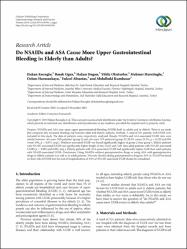Do NSAIDs and ASA cause more upper gastrointestinal bleeding in elderly than adults?

Göster/
Erişim
info:eu-repo/semantics/openAccessTarih
2016Yazar
Koçoğlu, HakanOğuz, Başak
Doğan, Hakan
Okuturlar, Yıldız
Hurşitoğlu, Mehmet
Harmankaya, Özlem
Kumbasar, Abdulbaki
Üst veri
Tüm öğe kaydını gösterKünye
Kocoglu H, Oguz B, Dogan H, Okuturlar Y, Hursitoglu M, Harmankaya O, Altuntas Y, Kumbasar A. Do NSAIDs and ASA Cause More Upper Gastrointestinal Bleeding in Elderly than Adults? Gastroenterol Res Pract. 2016. doi: 10.1155/2016/8419304.Özet
Purpose. NSAIDs and ASA may cause upper gastrointestinal bleeding (UGIB) both in adults and in elderly. There is no study that compares this increased bleeding risk between adult and elderly subjects. Methods. A total of 524 patients with UGIB were included in this study. The data of patients were, respectively, analyzed. Results. NSAIDs and ASA-associated UGIB rates were similar between <65 years (345 patients) (group 1) and ≥65 years (179 patients) (group 2) (28.4% versus 23.5%, p = 0.225 and 13% versus 19%, p = 0.071, resp.). Warfarin-associated UGIB was found significantly higher in group 2 than group 1. Elderly patients with NSAID-associated UGIB had significantly higher length of stay (LoS) and CoH than adult patients with NSAID-associated UGIB (p = 0.002 and 0.001, resp.). Elderly patients with ASA-associated UGIB had significantly higher CoH than adult patients with NSAID-associated UGIB. Conclusions. Using NSAIDs without gastroprotective drugs or using ASA with gastroprotective drugs in elderly patients is as safe as in adult patients. Not only should adding gastroprotective drugs to ASA or NSAID be based on their risk of UGIB, but the cost of hospitalization of ASA or NSAID-associated UGIB should be considered.

















